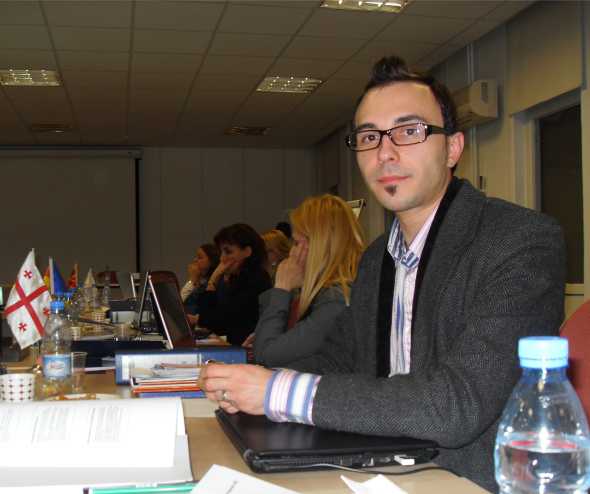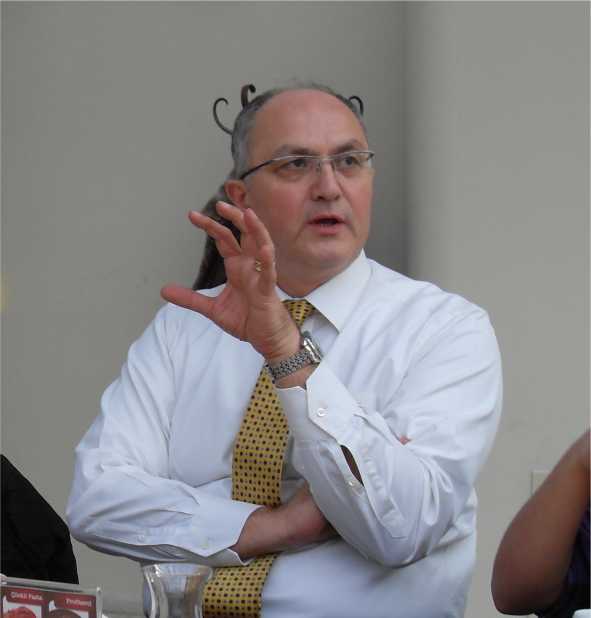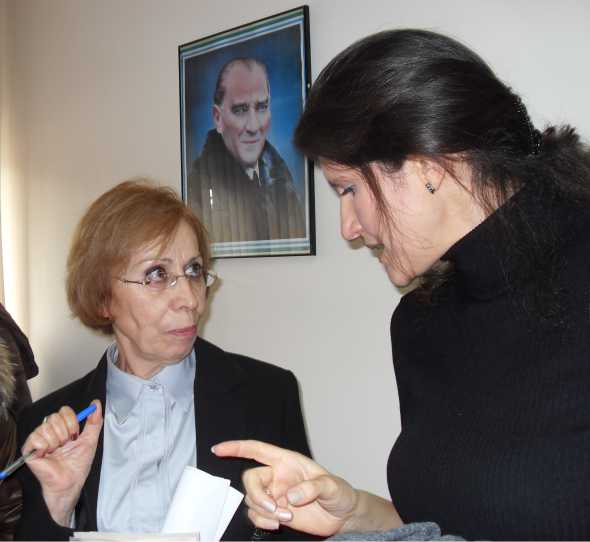18.12.2011International Children’s Center: “250 % is the increase of newly diagnosed with HIV in Eastern Europe and Central Asia (EECA)”. Training-Of-Trainers on sexual and reproductive health services for most-at-risk adolescents and young people took place in Ank
 The number of newly diagnosed with HIV in EECA went up with 250 % said Prof. Tomris Turmen – a Chairman of International Children’s Center (ICC). She shared this data during a Training-Of-Trainerscourse on providing comprehensive sexual and reproductive health services for most-at-risk adolescents and young people that took place at ICC in Bilkent University of Ankara, Turkey from 8th to 14th of December 2011.
The number of newly diagnosed with HIV in EECA went up with 250 % said Prof. Tomris Turmen – a Chairman of International Children’s Center (ICC). She shared this data during a Training-Of-Trainerscourse on providing comprehensive sexual and reproductive health services for most-at-risk adolescents and young people that took place at ICC in Bilkent University of Ankara, Turkey from 8th to 14th of December 2011.
Center Amalipe was represented by Momchil Baev who works on the issues of sexual and reproductive health (SRH), quality of service providing targeting most at risk young people (MARYP) and adolescents. The other participants were social workers, medical doctors, psychologists and service providers in the field of SRH from Turkey, Albania, Macedonia, Moldova and Georgia.
The UNFPA EECA Regional Office and the International Children’s Centre in Ankara have been collaborating on a long-term training strategy in the adolescent/youth field. Coordinator of the training course is Dr. Aysegul Esin – a public health Specialist and Reproductive Health Research Adviser at ICC. The long-term training strategy on Sexual and Reproductive Health (SRH) services for most-at-risk adolescents (MARA) and young people (MARYP) was focused on building capacity of national counterparts in comprehensive SRH and addressing SRH needs of most-at-risk adolescents and youth; establishing a systematic approach in training on comprehensive SRH services for most-at-risk adolescents and youth; setting up quality standards for the EECA region on SRH services for most-at-risk adolescents and youth; establishing competency standards for trainers; assessment and certification of trainers and monitoring and evaluation of training results and impact.
The purpose of the training-of-trainers (ToT) on comprehensive SRH of most-at-risk adolescents and youth is for trainers to be able to build professional skills of national counterparts to provide quality services to the targeted populations according to recognized standards and to disseminate knowledge in the region.
Some of the classes that the trainees had, covered Epidemiological Methods and Data Specific to Youth Health – Qualitative and Quantitative Research, Developing Standards for SRH Services, Issues in Managing HIV and other STI’s among MARYP, Assessment of Access and Quality of Services for MARYP
Leading co-trainers were experienced professionals Dr. Graham Neilsen,Thailand, Dr. Evert Ketting, Consultant, Senior Researcher, Pré Communicatie, The Netherlands, and guest trainers were Prof. Dilek Aslan, Hacettepe University, Turkey, Mr. Adem Arkadas, Child Rights Programme and Advocacy Officer, International Children’s Center.
On the last day of the training an essential part of the curriculum were two site visits – Hacettepe AIDS prevention and Investigation Center at the university hospital of Hacettepe University of Ankara and Skin and STI hospital.
 Prof. Serhat Unal who is a Director of the Infectious disease department at Hacettepe University shared interesting information that shocked the audience. Firstly he spoke of the year of 1985 when the first HIV positive was registered in Antalia. Since then in many cases HIV testing became compulsory. Before a surgery, during pregnancy, before compulsory military service everyone must take HIV test. Since 1986 in Turkey the Antiretroviral therapy (ART) is available and free of charge for the patients, Prof. Unal says. He recalls that back in 1992 he was the only doctor trained in HIV management; he just came back from Harvard University the same year and started working in the first HIV treatment and care center in Turkey. Nowadays there are about 20 centers that follow patients around Turkey. Prof. Unal disclosed that in the next three months the Turkish government would publish the National Guidelines for HIV treatment as he shared that Turkey is following the worldwide and American tendency to start ART at level of CD4 count 350 to 500, not 200 as it is in the region now. Not only the treatment itself has world-class standards in this university hospital. Seems like confidentiality of patients is very important and regarded issue in this traditional and largely religious country. Only three doctors in the entire hospital would know if someone is HIV positive. When patients come, they never pronounce the word HIV, they speak of it as “the weird disease” HIV/AIDS is still strongly stigmatized by the traditions and religion. Most people still believe that HIV is the homosexuals’ and sex workers’ disease. In 1993 was established the AIDS Prevention Society of Turkey, because “HIV is not just a medical disease, it’s a social reality and we have to handle the patient altogether”, Prof. Unal said and added that they have established a special care unit within the hospital to handle opportunistic conditions of their HIV positive patients. For example every newly diagnosed is seen by a psychiatrist to help the patients understand the diagnose or every female patient is seen by a gynecologist.
Prof. Serhat Unal who is a Director of the Infectious disease department at Hacettepe University shared interesting information that shocked the audience. Firstly he spoke of the year of 1985 when the first HIV positive was registered in Antalia. Since then in many cases HIV testing became compulsory. Before a surgery, during pregnancy, before compulsory military service everyone must take HIV test. Since 1986 in Turkey the Antiretroviral therapy (ART) is available and free of charge for the patients, Prof. Unal says. He recalls that back in 1992 he was the only doctor trained in HIV management; he just came back from Harvard University the same year and started working in the first HIV treatment and care center in Turkey. Nowadays there are about 20 centers that follow patients around Turkey. Prof. Unal disclosed that in the next three months the Turkish government would publish the National Guidelines for HIV treatment as he shared that Turkey is following the worldwide and American tendency to start ART at level of CD4 count 350 to 500, not 200 as it is in the region now. Not only the treatment itself has world-class standards in this university hospital. Seems like confidentiality of patients is very important and regarded issue in this traditional and largely religious country. Only three doctors in the entire hospital would know if someone is HIV positive. When patients come, they never pronounce the word HIV, they speak of it as “the weird disease” HIV/AIDS is still strongly stigmatized by the traditions and religion. Most people still believe that HIV is the homosexuals’ and sex workers’ disease. In 1993 was established the AIDS Prevention Society of Turkey, because “HIV is not just a medical disease, it’s a social reality and we have to handle the patient altogether”, Prof. Unal said and added that they have established a special care unit within the hospital to handle opportunistic conditions of their HIV positive patients. For example every newly diagnosed is seen by a psychiatrist to help the patients understand the diagnose or every female patient is seen by a gynecologist.
Hacettepe is one of the biggest private universities in the country that attracts students from around the country. Prof. Unal still assures us that 99 % of them have no idea what is sex, what is STI, what is relationship or birth control.
The idea of Sexual and reproductive health education would be a revolution for Turkey but Prof. Unal shares that many colleagues of him – professors and medical doctors whose sons study at Hacettepe call him and ask him to teach their sons about “those things”. But he can not do that for the female students…
The professor also shared that following the example of Hacettepe other five universities established special units or centers that deal specifically with HIV.
About 85 % of the population is under the health insurance system and about 12 % is under the special system called “Green card” for uninsured people. According to Prof. Unal 5000 HIV positive patients are registered in Turkey, 1000 of them are no longer alive. About 1700 of them are on ART and the number of children living with HIV is a 100.
 After Hacettepe University the trainees headed to the Skin and STI clinic for female sex workers also located in Ankara in one of the most marginalized neighbourhoods where a lot of female sex workers live. Dr. Nermin Percin hosted the group and she shared how the system of the clinic works with sex workers. The hospital provides treatment (HIV and other STI’s), care, prevention and vaccination for its patients. There are 40 officially registered female sex workers in Ankara. All of them are required by law to visit the clinic twice a week for genital exam and to take an HIV test every three months. All services at the clinic including testing and treatment is covered by the state budget regardless of the health insurance status of patients. Turkey has a specific law for primary level of care with allocated budget for that. All patients who test positive for HIV are being referred to a university hospital for special care. Nevertheless, the entire staff at the STI clinic is trained in HIV counselling which is an essential service for every newly diagnosed patient in the process of understanding the new condition. Dr. Percin says that the clinic is visited by 50-60 people daily for counselling. About 50 are the transgender patients that are registered at the clinic.
After Hacettepe University the trainees headed to the Skin and STI clinic for female sex workers also located in Ankara in one of the most marginalized neighbourhoods where a lot of female sex workers live. Dr. Nermin Percin hosted the group and she shared how the system of the clinic works with sex workers. The hospital provides treatment (HIV and other STI’s), care, prevention and vaccination for its patients. There are 40 officially registered female sex workers in Ankara. All of them are required by law to visit the clinic twice a week for genital exam and to take an HIV test every three months. All services at the clinic including testing and treatment is covered by the state budget regardless of the health insurance status of patients. Turkey has a specific law for primary level of care with allocated budget for that. All patients who test positive for HIV are being referred to a university hospital for special care. Nevertheless, the entire staff at the STI clinic is trained in HIV counselling which is an essential service for every newly diagnosed patient in the process of understanding the new condition. Dr. Percin says that the clinic is visited by 50-60 people daily for counselling. About 50 are the transgender patients that are registered at the clinic.
Part of the female sex workers (FSW) in Ankara are registered and the law connects the permit for sex-working with the drug adherence and STI screening. In other words if the FSW do not comply with treatment (when needed) and with regular STI screening she looses her permit to be a sex worker.
According to the official statistics Turkey has a very low HIV prevalence compared to other countries in EECA region. The total population of Turkey is about 70 million people.








